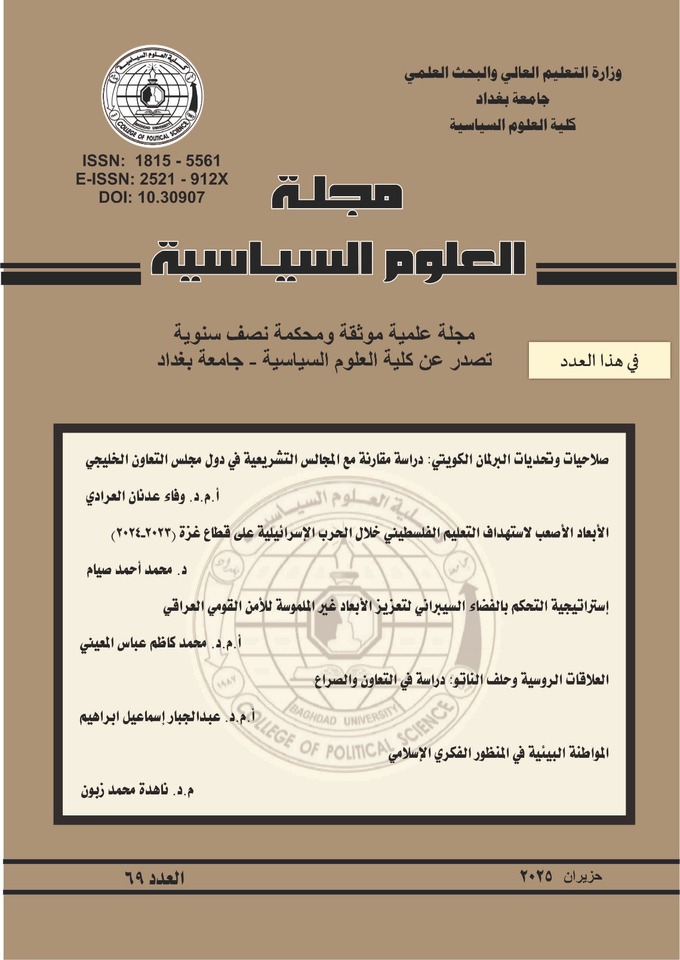Abstract
This study examines the constitutional powers of the Kuwaiti National Assembly in legislation and oversight, while identifying the key challenges that hinder the effective exercise of these powers. Despite its broad constitutional authority, the Assembly faces significant obstacles in advancing electoral, societal, and legal reforms. The study adopts a qualitative methodology, including a descriptive analytical approach to understand the nature of the Kuwaiti parliamentary system, a historical approach to trace the pivotal stages since the Assembly’s establishment in 1963, and a comparative approach to analyze Kuwait’s parliamentary experience relative to other legislative bodies in the Gulf region. The findings indicate that Kuwait’s Parliament—one of the earliest legislative councils in the Gulf Cooperation Council (GCC)—holds distinctive authority in legislative, oversight, and financial affairs. However, ongoing tensions between the legislative and executive branches, alongside social, economic, and regional challenges, hinder its institutional development and performance. The analysis shows that Kuwait’s Parliament is unique in its electoral mechanisms, government accountability, and level of independence. Public opinion and political pressures significantly influence its functioning. The study concludes that while the Kuwaiti parliamentary model remains distinctive in the Gulf context, it urgently requires institutional reforms, particularly in enhancing executive-legislative cooperation, combating corruption, and improving electoral laws to promote political stability and equitable representation.
Keywords
1962 Constitution
and Consultative Councils
Appointed
Authorities of the National Assembly
elected
GCC States.
The Future of the Kuwaiti Parliament
the State of Kuwait
Abstract
تهدف هذه الدراسة إلى تسليط الضوء على الصلاحيات الدستورية لمجلس الأمة الكويتي في التشريع والرقابة، مع تحديد التحديات الرئيسية التي تحول دون ممارسة هذه الصلاحيات بفعالية. وعلى الرغم من سلطته الدستورية الواسعة، يواجه المجلس عقبات كبيرة في دفع عجلة الإصلاحات الانتخابية والمجتمعية والقانونية. اعتمدت الدراسة منهجية نوعية تضمنت التحليل الوصفي لفهم طبيعة النظام البرلماني الكويتي، والمنهج التاريخي لتتبع المراحل المفصلية التي مرّ بها المجلس منذ نشأته عام 1963، بالإضافة إلى المنهج المقارن لمقارنة التجربة الكويتية بنظيراتها في دول الخليج العربي. وتوصلت الدراسة إلى أن برلمان الكويت، وهو من أوائل المجالس التشريعية في دول مجلس التعاون الخليجي، يتمتع بسلطة متميزة في المسائل التشريعية والرقابة والمالية. ومع ذلك، فإن التوترات المستمرة بين السلطتين التشريعية والتنفيذية، إلى جانب التحديات الاجتماعية والاقتصادية والإقليمية، تعيق تطوره وأدائه المؤسسي. ويكشف التحليل أن برلمان الكويت يتميز من حيث آلياته الانتخابية ومساءلة الحكومة واستقلاليته، ويلعب الرأي العام والضغوط السياسية دورًا مهمًا في تشكيل أعماله. وخلصت الدراسة إلى أنه في حين يظل النموذج البرلماني الكويتي فريداً من نوعه في السياق الخليجي، فإنه يتطلب بشكل عاجل إصلاحات مؤسسية، وخاصة في تعزيز التعاون التنفيذي والتشريعي، ومكافحة الفساد، وتحسين القوانين الانتخابية لتعزيز الاستقرار السياسي والتمثيل العادل.
Keywords
مستقبل البرلمان الكويتي، صلاحيات مجلس الأمة، دولة الكويت، دستور 1962، المجالس المنتخبة والمعينة والاستشارية، دول مجلس التعاون الخليجي.
